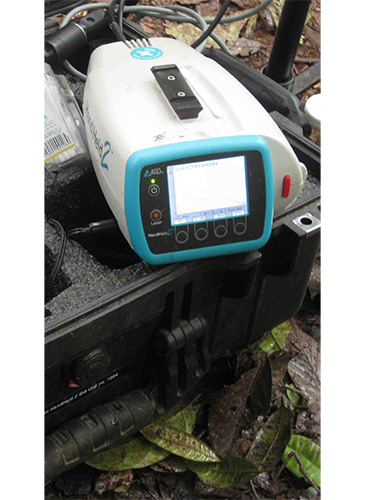Update: Analytik reports on the ASD FieldSpec HandHeld 2 use in the Amazon rainforest by the Tropical Forest Science group at Oxford University
 In 2014, we reported on how handheld spectroscopy was being used at the University of Oxford’s Environmental Change Institute.
In 2014, we reported on how handheld spectroscopy was being used at the University of Oxford’s Environmental Change Institute.
Dr Chris Doughty is a lecturer in ecosystem ecology within the Environmental Change Institute (ECI) at the University of Oxford. He is also a Junior Research Fellow in the Tropical Forest Science group of the ECI.
Chris describes his work and vision where a handheld spectrometer becomes a vital part of his laboratory on the move. “Our goal is to use leaf spectroscopy to predict leaf traits (photosynthesis, leaf chemistry, etc.). We then hope to develop these techniques to eventually use airborne remote sensing above the forest to better predict the carbon balance and health of tropical forests.” Currently he is coordinating research at seventeen rainforest plots in six sites across the Amazon basin. At these plots, intensive monitoring of forest carbon cycling and allocation will: 1) provide baseline estimates of current forest carbon storage, and 2) track ongoing changes in forest carbon cycling. These results will help to develop the next generation of coupled atmosphere-biosphere models and guide international climate policy.
Chris’ enthusiasm for his research is clear: “I love studying tropical forests because they are important stores of biodiversity and carbon, but they are often difficult to study due to their remote locations. Our work will hopefully make it easier to measure and understand forests in the most remote regions.”
Speaking of his choice of the portable Vis-NIR FieldSpec system, he noted, “I had previously learned on another ASD spectrometer from 400-2500 nm and an integrating sphere. Moving to the new FieldSpec HandHeld 2 has provided me with a system that is robust in the field, easy to carry and ideal for my diverse working environments.”
The FieldSpec HandHeld 2 spectroradiometer performs rapid, precise, non-destructive and non-contact spectral measurement in a truly portable design. The HandHeld 2 minimises field data collection time while maximising the quality of spectral results.
![]() Download Original Press Release
Download Original Press Release
Find out more about the ASD FieldSpec Spectroradiometer.
2018 update: Chris is now in the role as an Assistant Professor of ecoinformatics at Northern Arizona University. His research combines computational and field methods to better understand how these changes will affect ecosystems, with a specific focus on tropical forests. One major goal of his research is to determine how climate change will affect tropical forests and how this might, in turn, impact global climate. He combines a large network of field plots from South America, Africa, and Asia with remote sensing and models to better understand and predict forest growth patterns and carbon uptake. Another major goal is to understand how the loss of large mammals will impact nutrient distribution and forest structure globally. He uses both simple and complex models to predict nutrient diffusion and verifies these models using both field and paleo-data.


